This week we are delighted to bring an article by a guest author, Dr. Deb Fordice, a K-5 music teacher. She reminds us that we can inspire learning when we look at something with fresh eyes. We can find new ways to connect knowledge, skill, passion and joy. What can you do to make learning memorable this week?
 After teaching for 14 years at the college level, I returned to the elementary classroom this year. Although I have nearly two decades of P-12 teaching experience, in many ways I feel like a brand new teacher again! I teach music to K-5 children and am rediscovering a key to pure joy in the classroom: using materials from the natural world.
After teaching for 14 years at the college level, I returned to the elementary classroom this year. Although I have nearly two decades of P-12 teaching experience, in many ways I feel like a brand new teacher again! I teach music to K-5 children and am rediscovering a key to pure joy in the classroom: using materials from the natural world.
While I appreciate ready-made lessons and materials I can find online, natural materials that are right in front of me in the world inspire my students so much more. I feel like I have put on a pair of “What can I use to teach this thing?” glasses. They inspire magic!
For example, last Saturday I was at the Farmer’s Market wearing those magic glasses, thinking about my kindergarten students. It’s the beginning of fall, and the children are practicing how to speak and move to various rhythms. What could I do to bring their natural interest in the changing season into this musical content?
And there it was, right in front of me at a farmer’s stand, thanks to my magic glasses! A HUGE zucchini. A zucchini that could become a phrase to repeat and layer other vegetable phrases onto! Vegetables were everywhere, transforming into rhythmic phrases right before my eyes…
“Zooooo-chini, not so teeny!”
“Habanero, hot! Tsss! Habanero, hot! Tsss!”
“Pep-per, pep-per, red bell pepper!”
“Gourd, gourd, beautiful gourd!”
On Monday, I packed my veggies and headed to school, excited for the lesson! The children would practice steady beat and explore their high and low voices while learning about these precious items from the world around them. And it worked.
In fact, it inspired and stuck with the children so strongly that over a week later, in their own kindergarten classroom, with smiles, pulsing heads, and clapping hands, they enthusiastically started chanting the veggie phrases on their own as a kindergarten classroom community! The teacher grabbed her phone and took a video. The students wanted to, and were able to, chant the phrases together without me there!
I choked up a bit when the teacher showed me the video. Knowledge. Skill. Passion. And joy! I acknowledged the power of the glasses and started looking with eyes wide open for other materials that could bring more of this magic into my classroom.
What did my magic classes help me see next? Leaves. Everywhere! They are remarkably interesting and are right there, abundantly waiting to inspire my students. Next week for vocal exploration, the repeated text in a children’s book about leaves will become a chant, flowing up and down pitch-wise like leaves blowing in the wind.
For creative movement, children will make their bodies into the shapes of leaves spread on the floor around the room, some wide and full, some crumpled and dry. They will then pretend it is their time to come off their trees. Will they tear off in a strong wind? Release gently after a steady ran shower? Shiver off on an especially cold day? My students will look at trees, leaves, and autumn with new, wondering, and respectful eyes.
So how might you use these magic glasses, too?
- Take your other glasses off. In order to see what’s around you, your eyes must be open to original possibilities. Allow yourself to take off the “Teacher’s Manual” and “Online” glasses once in a while. The magic glasses are empowering!
- Train the glasses to merge content with stuff. What knowledge and skills are on the docket in your classroom? What pops out as natural material to support that content? Think: How can I use that thing to engage my students in this concept?
- Keep it simple. These magic glasses are powerful, indeed. You may suddenly see so many things you could easily go overboard. Green beans, tomatoes, potatoes, kale, radishes, and carrots would have made great rhythms, too. I wanted to gather them all! But I knew that too many veggies would have overwhelmed both the kids and me. It’s better to focus on a few things at a time.
What could you bring into your lessons next week? Put on the glasses. The magic is there, just waiting for you to discover it.
 Dr. Debrah Fordice teaches elementary music in the Iowa City Community School District. She taught P-12 music and general elementary education for 18 years before transitioning to work in school reform and teacher education. After 17 years of teaching veteran teachers and teachers-to-be, she is fulfilling her vision of returning to the elementary classroom for her final teaching chapter.
Dr. Debrah Fordice teaches elementary music in the Iowa City Community School District. She taught P-12 music and general elementary education for 18 years before transitioning to work in school reform and teacher education. After 17 years of teaching veteran teachers and teachers-to-be, she is fulfilling her vision of returning to the elementary classroom for her final teaching chapter.


Leave a Reply